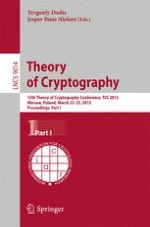2015 | OriginalPaper | Chapter
Complete Characterization of Fairness in Secure Two-Party Computation of Boolean Functions
Authors : Gilad Asharov, Amos Beimel, Nikolaos Makriyannis, Eran Omri
Published in: Theory of Cryptography
Publisher: Springer Berlin Heidelberg
Activate our intelligent search to find suitable subject content or patents.
Select sections of text to find matching patents with Artificial Intelligence. powered by
Select sections of text to find additional relevant content using AI-assisted search. powered by
Fairness is a desirable property in secure computation; informally it means that if one party gets the output of the function, then all parties get the output. Alas, an implication of Cleve’s result (STOC 86) is that when there is no honest majority, in particular in the important case of the two-party setting, there exist Boolean functions that cannot be computed with fairness. In a surprising result, Gordon et al. (JACM 2011) showed that some interesting functions can be computed with fairness in the two-party setting, and re-opened the question of understanding which Boolean functions can be computed with fairness, and which cannot.
Our main result in this work is a complete characterization of the (symmetric) Boolean functions that can be computed with fairness in the two-party setting; this settles an open problem of Gordon et al. The characterization is quite simple: A function can be computed with fairness
if and only if
the all one-vector or the all-zero vector are in the affine span of either the rows or the columns of the matrix describing the function. This is true for both deterministic and randomized functions. To prove the possibility result, we modify the protocol of Gordon et al.; the resulting protocol computes with full security (and in particular with fairness) all functions that are computable with fairness.
We extend the above result in two directions. First, we completely characterize the Boolean functions that can be computed with fairness in the multiparty case, when the number of parties is constant and at most half of the parties can be malicious. Second, we consider the two-party setting with asymmetric Boolean functionalities, that is, when the output of each party is one bit; however, the outputs are not necessarily the same. We provide both a sufficient condition and a necessary condition for fairness; however, a gap is left between these two conditions. We then consider a specific asymmetric function in this gap area, and by designing a new protocol, we show that it is computable with fairness. However, we do not give a complete characterization for all functions that lie in this gap, and their classification remains open.
